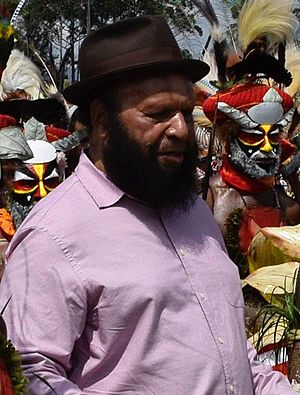Paias Wingti facts for kids
Quick facts for kids
Paias Wingti
|
|
|---|---|

Wingti in 2018
|
|
| 3rd Prime Minister of Papua New Guinea | |
| In office 17 July 1992 – 30 August 1994 |
|
| Monarch | Elizabeth II |
| Governor-General | Wiwa Korowi |
| Preceded by | Rabbie Namaliu |
| Succeeded by | Julius Chan |
| In office 21 November 1985 – 4 July 1988 |
|
| Monarch | Elizabeth II |
| Governor-General | Sir Kingsford Dibela |
| Preceded by | Michael Somare |
| Succeeded by | Rabbie Namaliu |
| Personal details | |
| Born | 2 February 1951 Moika Village, Territory of Papua and New Guinea |
| Political party | Pangu Party (Until 1985) People's Democratic Movement (1985-Present) |
| Spouse | Dianne Kende (1991-1994) |
| Children | 1 |
| Education | University of Papua New Guinea |
Paias Wingti (born 2 February 1951) is a well-known politician from Papua New Guinea. He served as the Prime Minister of Papua New Guinea two times. His first term was from 1985 to 1988, and his second was from 1992 to 1994.
Contents
Early Life and Education
Paias Wingti came from the Jika Tribe in the Western Highlands province. He was born in Moika village, which is close to Mount Hagen. He started school when he was 10 years old and later attended Mount Hagen High School.
In 1974, he began studying at the University of Papua New Guinea in Port Moresby. While there, he visited Australia as a student representative. In 1977, during his final year studying Economics, he ran in the election. He won the Hagen Open seat and joined Michael Somare's Pangu Party.
Political Career Highlights
Becoming Prime Minister
On 21 November 1985, the Prime Minister at the time, Michael Somare, lost a vote of no confidence. This meant that many politicians no longer supported him. Paias Wingti was then chosen to become the new Prime Minister. He was the first person from the New Guinea Highlands region to hold this important position.
Wingti's party kept its majority in the 1987 election. He won against Michael Somare in a vote of 54 to 51 to remain Prime Minister.
Challenges and Changes
In November 1987, Ted Diro, a key member of Wingti's government, resigned. Diro was the leader of the People's Action Party. He later tried to get a position back in Wingti's government, but Wingti did not agree.
On 11 April 1988, Diro asked to be made Deputy Prime Minister. If he wasn't, his party would join the opposition. Parliament met that day but closed quickly to stop a vote of no confidence against Wingti. Diro was given a role in the government, but some other politicians were not happy about this.
When parliament met again on 27 June, a vote of no confidence was brought forward. Diro then changed his support from Wingti to Rabbie Namaliu. On 4 July, Wingti's government lost the vote of no confidence by 58 to 50. A new government was then formed by Namaliu.
Return to Power
New elections were held in 1992. On 17 July, Paias Wingti won against Rabbie Namaliu to become Prime Minister again. The vote was very close, 55 to 54, with the Speaker casting the deciding vote.
In 1993, Wingti was worried about a challenge from his Deputy Prime Minister, Julius Chan. To protect his position, he secretly resigned in September. He was then re-elected by parliament the very next day. This move was meant to protect him from another vote of no confidence for 18 months.
However, the opposition disagreed and took the matter to court. On 25 August 1994, the Supreme Court of Papua New Guinea decided that Wingti's resignation was valid. But they also ruled that his re-election was not valid because parliament was not properly told about his resignation. So, on 30 August, Julius Chan was elected Prime Minister by a vote of 70 to 32.
Later Political Life
In the 1997 election, Robert Lak, a Catholic priest, won against Wingti. However, Wingti won his seat back in the 2002 election. In the 2007 election, an independent candidate named Tom Olga defeated Wingti.
In 2004, Wingti led 14 Members of Parliament in a vote to remove Mekere Morauta as the opposition leader. He was replaced by Andrew Baing. Later that year, Wingti was suggested as an alternative Prime Minister during a vote of no confidence. However, he stepped aside for Peter O'Neill, who was more popular at the time.
Policies and Focus Areas
Economic Policies
During Wingti's time as Prime Minister, the country's budget deficit grew. This means the government was spending more money than it was taking in. The deficit increased from 1.2% of the country's total economic output (GDP) in 1989 to 10.8% in June 1994. By October, the deficit was reduced through measures like reducing government jobs and cutting spending.
Governance and Provinces
When Wingti first became Prime Minister in 1985, the local governments in Enga, Chimbu, and Manus provinces were temporarily suspended.
Foreign Relations
In 1985, Papua New Guinea spoke out against France's nuclear testing in the Pacific Ocean. They also called for New Caledonia to become independent.
In 1986, Papua New Guinea and Indonesia signed a treaty to show mutual respect and friendship. However, the Indonesian military sometimes entered Papua New Guinea without permission while fighting the Free Papua Movement. In April 1988, Indonesian soldiers stayed in Papua New Guinea for three weeks before leaving after contact with the Papua New Guinea Defence Force.
Personal Life
Paias Wingti married Dianne Kende in 1991, and they had one child. They later divorced in 1994.
 | Chris Smalls |
 | Fred Hampton |
 | Ralph Abernathy |

